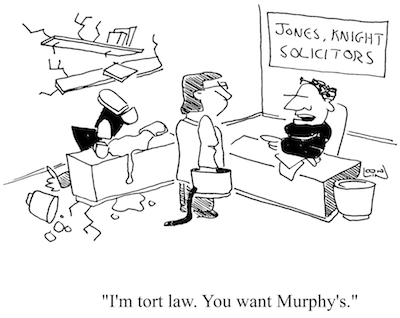 A tort is an injury that has legal consequences and is more commonly referred to as personal injury. Tort in New Jersey and elsewhere provides legal remedies for people who have been injured or harmed physically, emotionally or financially. It also defines the type of injury a person suffered and the circumstances by which another party may be held legally responsible and liable to the injured party.
A tort is an injury that has legal consequences and is more commonly referred to as personal injury. Tort in New Jersey and elsewhere provides legal remedies for people who have been injured or harmed physically, emotionally or financially. It also defines the type of injury a person suffered and the circumstances by which another party may be held legally responsible and liable to the injured party.
Tort law also imposes a legal duty on people to use due care, or to act reasonably or responsibly. For example, everyone who drives a motor vehicle has a duty to use reasonable care while driving. If you are driving in a snow storm under icy conditions, you may be acting unreasonably by driving the speed limit since your vehicle can easily lose control and cause an accident that physically injures other people.
People who have been injured in an accident may be able to bring a claim for damages against the responsible person or entity if they can prove liability, that an injury occurred and that the injury was the result of the accident.
Torts, or personal injury, comes in different forms depending on the facts of the accident and such factors as where the accident happened, the status of the responsible party and the mechanism of the injury. A particular tort or personal injury may have different elements that must be proved by the civil standard of preponderance of the evidence, or that it was more likely than not that liability and damages have been established.
Types of Torts or Personal Injury Claims
There are numerous types of personal injury claims for which compensation may be paid to the injured party:
- Motor vehicle accidents
- Product liability
- Dog or animal attack
- Premises liability
- Toxic tort
- Wrongful death
- Medical malpractice
- Intentional tort
Different elements that comprise these types of injuries need to be proved by the person bringing the claim so that compensation may be paid. Each of the torts may include a number of causes of action that a claimant may allege including:
- Negligence
- Breach of warranty
- Strict liability in tort
- Intentional tort
Although a tort or personal injury is litigated in the civil courts, you can bring a tort action in civil court if you were injured as a result of someone’s criminal conduct.
Negligence
To prevail in most personal injury claims, the claimant or plaintiff needs to prove that the responsible party’s conduct in causing the accident was negligent. Negligence is most commonly alleged in motor vehicle accidents. Negligence has four elements:
- Everyone has a duty to use reasonable care in our everyday activities. If there is an injury, the injured parties must show that there was a duty of care between them and the responsible party who failed to act reasonably to prevent the injury. Reasonable care is what an ordinary person would do under similar circumstances.
- If the party who caused the accident failed to use reasonable care, then it breached the duty to use reasonable care.
- The breach of the duty to use reasonable care must have been the proximate cause of the injury; or that the injury would not have occurred but for the breach.
- There must be an injury caused by the breach of care. It can physical, financial or emotional.
There may be higher duties of care depending on the status of the liable party. A commercial truck driver and physician have special duties of care as do business owners in slip and fall or premises liability cases.
Medical Negligence
A medical professional has a particular duty to use reasonable care toward patients since a physician has special training and knowledge that ordinary people do not possess. A doctor has a duty to use the care expected of a reasonable physician with the same specialty acting in a similar community under similar circumstances.
Typical medical malpractice actions include failure to diagnose, negligent treatment, failure to obtain implied consent and negligence during or after surgery. A hospital or medical or nursing facility may also be found liable for negligent hiring, maintaining equipment, keeping unsanitary or unsafe facilities or for lacking required or standard protocol in delivery of services.
Premises Liability
A business owner has a duty toward business invitees that involves a higher duty of care than that of a homeowner towards his or her guests or visitors. A business owner has a duty to inspect and uncover unreasonable risks of harm and to remedy or warn invitees of the danger. There is also the element of notice of the harm, which can be actual or constructive. The latter involves imputed knowledge of the existence of the hazard if it was present long enough so that the owner should have been aware of it.
A homeowner does not have the duty to look for hazardous conditions but does need to warn guests of its existence if known.
A property owner does not have a duty of care towards a trespasser but cannot intentionally harm the trespasser such as by springing a trap or by not warning of an electrified fence.
Product Liability
Implied Warranty
A manufacturer and designer of a product offered to the public has a duty to use reasonable care. Products such as cars, toasters, medical devices and drugs also are under implied warranties of merchantability and fitness, or that they meet accepted or ordinary standards of care and are of the same average quality and value of similar goods sold under similar circumstances. The consumer must have used the product in the way it was intended.
Fitness implies that the product was fit for the ordinary purpose for which it was sold. This implied warranty, however, requires that the seller know of the buyer’s particular purpose for using the product and of the buyer’s reliance on the seller’s knowledge and skill, and that the buyer did rely on the seller’s peculiar expertise.
Express Warranty
This refers to a written warranty or provision in a contract between the buyer and seller regarding the quality or fitness of a product sold to consumers. Warranty protection is offered under the Uniform Commercial Code (UCC), adopted by all states in some or all parts, which an aggrieved consumer can refer to allege breach of an express warranty. The UCC also provides standards regarding disclosure and what remedies are available.
Negligence
Products like medical devices or drugs must meet standards of care. You can bring an action under a negligence cause of action for a defect in manufacture or for negligent design. Also, certain products must meet standards from the FDA. Manufacturers must also post adequate warnings about a product’s risks and complications.
Strict Liability
Another cause of action in product liability is strict liability. If you can prove the product was defective and that the defect was the proximate cause of your injury and rendered the product unreasonably dangerous, then you may recover damages. A defense by the manufacturer that it followed or used all reasonable care in its manufacture or sale is irrelevant.
Dog Bite or Animal Attack
New Jersey is a strict liability state regarding animal attacks. Dog owners are held liable for any injuries and damages caused when their dog bites or attacks another person who is lawfully on the owner’s private property or on public property. Whether the dog previously attacked someone or that the owner was unaware of the dog’s vicious propensities is not relevant.
The claimant need only show that the defendant owned the dog, the he or she was bitten or attacked by the dog, and that the claimant was legally on public or private property. The owner is not liable to trespassers with criminal intent. An injured party could be held comparatively liable under some circumstances but not someone under the age of 7.
An injured victim can also use traditional negligence law to prove liability.
Wrongful Death
A person who dies as a result of the negligent conduct of another person, or by their intentional act, may have their heirs or survivors bring a claim for damages. Any personal injury or tort can result in a death so the elements of that particular tort must be proved.
Wrongful death claims may be made by the decedent’s immediate survivors such as the parents, spouse or children. The type of damages claimed depend on who is bring the claim. Damages include:
- Funeral and burial expenses
- Lost earnings over the working life of the decedent
- Medical expenses, if any
- Loss of services for child care and household duties
- Loss of love, companionship and spousal relations
A separate claim for pain and suffering, if the decedent survived for a time before succumbing, can be brought under New Jersey’s survival statute by the estate. Other damages under this statute include any other that could have been brought by the decedent if he or she had survived until the time of death. Compensation awarded under this statute may be claimed by the decedent’s creditors.
Survivors who witnessed the decedent’s death, such as in a car accident, and you had a marital or close family relationship and suffered severe emotional distress can claim negligent infliction of emotional distress.
Intentional Tort
If the liable party intentionally caused the accident or incident that led to your injury or caused the death of someone, a civil tort action for compensation can be brought. This includes murder, assault, attempted murder, robbery, or any other act of violence. It could also include acts by individuals or companies who ignored or attempted to hide known hazards from the consumer or who intentionally fabricated data or other claims to sell a product.
You may collect punitive damages, along with any other compensable damages such as general and special damages, if the conduct of the liable party was so reckless or egregious to cause significant harm. This would include sexual assaults, murder, attempted murder, fraud or any other act that showed a deplorable disregard or indifference to the safety or lives of others.
Different rules and laws regarding notice and the statute of limitations for bringing a tort claim may apply depending on the type of tort and if a public entity is the alleged liable party.
Tort in New Jersey
Tort law can present complicated issues of liability and proof and previously unknown parties could have contributed to your injury and damages. Contact an experienced and knowledgeable New Jersey tort or personal injury lawyer to handle your injury case and to get you the compensation you deserve.

